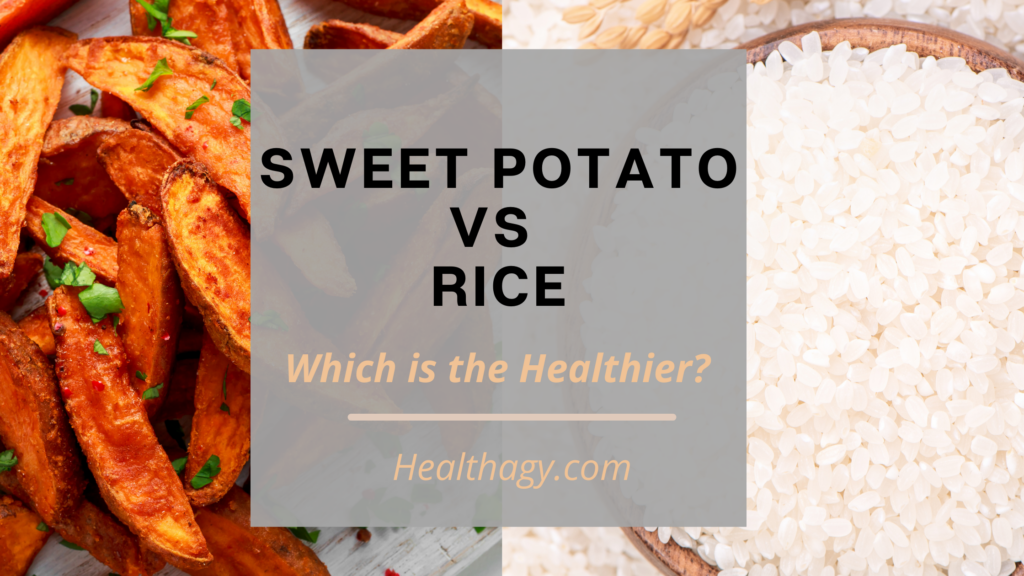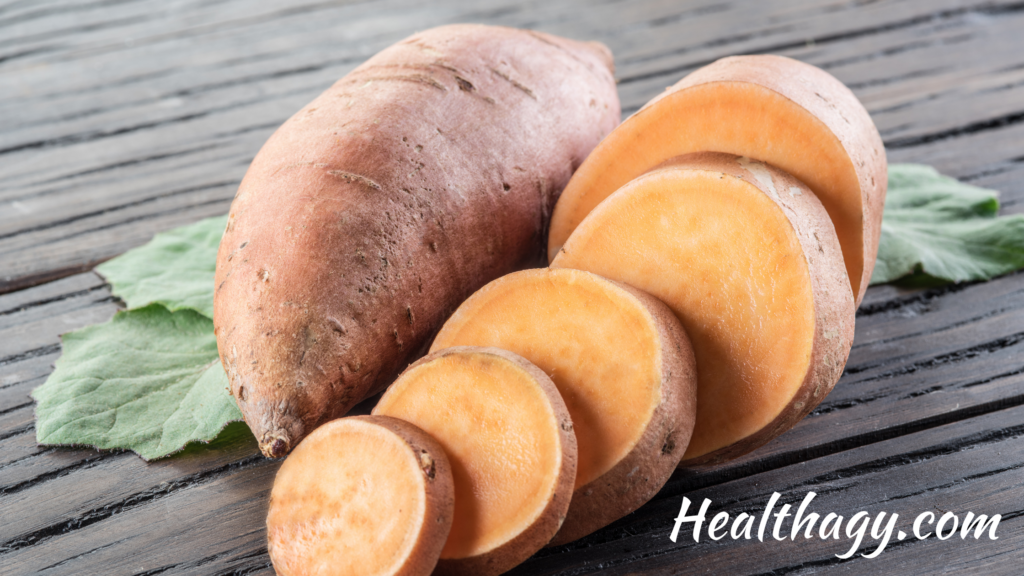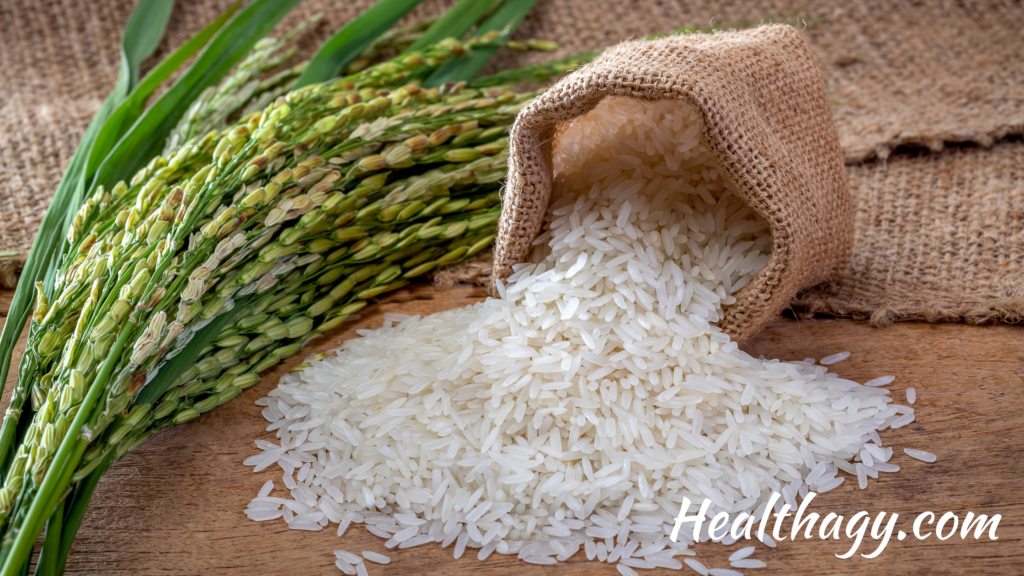
Two healthy and popular side dishes are sweet potatoes and rice. They both have their place in providing nutritional value and great taste, but which one is a healthier choice when given a choice?
Key Nutritional Differences: Sweet Potato vs Rice
Sweet potatoes have the gold star when it comes to vitamin A. They also come out ahead of rice in calcium, vitamin C, vitamin E, potassium, copper, and several B vitamins. Brown rice is an excellent source of manganese while also boasting more magnesium, calcium, and phosphorous- but not enough to edge out the exceptional vitamin A content sweet potatoes have.

Sweet Potato Nutrition
Sweet potatoes are a favorite vegetable of many, including myself! They are are a whole food, a vegetable, and more specifically a tuber, grown underground.
They are very nutritious, a rich source of beta carotene, and provide a good amount of vitamin C, potassium, and fiber. They also provide adequate amounts of several other vitamins, minerals, and antioxidants such as manganese, B vitamins, and vitamin E.
Sweet Potato Health Benefits
Sweet potatoes are an excellent source of vitamin A. Vitamin A supports eye health, a healthy gut, and your immune system. They also contain vitamin C and B vitamins, which support healthy cells and overall well-being. Sweet Potatoes contain an antioxidant, carotenoids, which give them their rich color and help protect your cells against damage.
Sweet potatoes contain adequate amounts of magnesium and potassium, both of which can help regulate blood pressure, which helps reduce the risk of cardiovascular disease.
Sweet Potato Gut Health
Sweet potatoes contain antioxidants as well as both soluble and insoluble fiber. All of which provide a variety of benefits to your gut by promoting the growth of good bacteria.
Many of the carbs in sweet potatoes are attributed to resistant starch, which the body doesn’t digest. Instead, it is fermented in the gut, producing short-chain fatty acids. These help aid in nutrient absorption, fuel healthy gut bacteria, reduce inflammation, and help you feel fuller longer.
Sweet potatoes have a high fiber content, which can help prevent constipation, supporting overall digestion and gut health.
Sweet Potatoes Carbohydrates and Starch
Sweet potatoes are starchy vegetables containing complex carbohydrates, considered to be a healthy source of nutrient-dense carbohydrates. A medium sweet potato is about 150 grams, containing roughly 26 grams of carbohydrates with about 4 grams of fiber.
Carbohydrates are an essential source for fueling your body’s energy. Your brain, kidneys, heart muscles, and central nervous system all rely on carbohydrates to function at their best.
However, some people opt for a low-carb diet for weight loss or for other various reasons. If you are on a low-carb diet or keto diet, you may have to eat sweet potatoes in moderation or smaller portions to stay within your goals. Sweet potatoes are still a better option than white potatoes, which have about 36 grams of carbs.
Sweet Potatoes and Blood Sugar
Sweet potatoes are relatively high in carbohydrates, which can spike blood sugar levels. The fiber in sweet potatoes can help manage it, though. Some studies have also shown that the cooking process matters in preparing your sweet potatoes regarding the glycemic index rating. Boiling or steaming sweet potatoes results in a low glycemic index of about 44, while a peeled and baked sweet potato has a high glycemic index of about 94.

Rice Nutrition
Rice has benefits such as being low in calories and fat, full of vitamins, minerals, complex carbohydrates, and adequate fiber content. Before cooking, soaking and sprouting rice can provide even more nutrients and support digestion.
Brown Rice Nutrition
Brown rice is whole grain rice. As a whole grain, the rice grain is whole and fully intact. Brown rice is filled with proteins, vitamins, and minerals such as thiamine, calcium, magnesium, fiber, and potassium.
White Rice Nutrition
White rice is a refined grain. This means the rice has been processed to remove the husk, bran layer, and most of the germ. This refining process results in the loss of vitamins and mineral content. To counteract this loss of nutrition, white rice is typically artificially fortified with nutrients, much like breakfast cereals are fortified.
White rice still has nutritional benefits though, especially when paired with other proteins and veggies. White rice is a simpler carbohydrate than brown rice, which your body has an easier time digesting. For some people with digestive issues, white rice may be a better option than brown rice. White rice also provides a quicker source of energy, which may benefit athletes.
Rice Health Benefits
Rice is one of the most popular gluten-free grains. One of the great benefits of rice is that it is anti-inflammatory, helping to support your body in keeping inflammation at bay. Rice also contains a variety of B vitamins, which help support a healthy nervous system. Brown rice is also a great source of magnesium which is anti-inflammatory and helps support a healthy mood.
Rice Gut Health
Rice is high in fiber, which makes it a great option for helping to regulate the digestive system, reducing constipation, and supporting overall gut health. Brown rice can also help support healthy gut bacteria.
Rice and Carbohydrates
Brown rice and white rice are both complex carbohydrates. White rice has less nutritional value than brown rice, as brown rice is a whole grain.
Rice and Blood Sugar
As there are various types of rice, rice varies significantly on the glycemic index scale from low to high.
White rice is a refined carbohydrate that can raise blood sugar levels and put people more at risk of developing type 2 diabetes. However, brown rice seems to affect the body differently.
Brown rice is high in carbs like white rice and has only a slightly lower glycemic index level, and it also increases insulin sensitivity. It causes less of a blood sugar spike than white rice.
If you are specifically looking for low GI rice, basmati rice is your best option as it carries a lower GI rating of about 55-65 or black rice, which can have a GI rating in the 40’s. If regulating your blood sugar levels is vital to your health, it’s best to speak with your doctor and investigate which type of rice and which brand is best for you as rice can be marketed under the same kind but still vary in their GI rating.
Nutritional Comparison Between Sweet Potato vs Rice
Nutritional value for 100 grams of sweet potato versus 100 grams of rice (brown rice and white rice).
For reference: An average 5-inch long medium sweet potato is about 130 grams. One cup of cooked brown rice is about 195 grams. One cup of cooked white rice is about 158 grams.
This chart shows the % RDI (recommended dietary intake), Daily Value (DV)
| 100 g of Sweet Potatoes | 100 g of Brown Rice | 100 g of White Rice | |
| Calories | 86 | 112 | 130 |
| Total Fat | 0.1 g | 0.8 g | 0.3 g |
| Cholesterol | 0mg | 0mg | 0 mg |
| Total Carbohydrate Dietary Fiber | 20.1 g, 7% 3 g, 11% | 23.5 g, 8% 1.8 g, 6% | 28.2 g, 9% 0.4 g, 1% |
| Total Sugars Includes ~g Added Sugars | 4.2 g, 8% ~% | ~% ~% | 0.1 g, 0% ~% |
| Protein | 1.6 g, 3% | 2.3 g, 5% | 2.7 g, 5% |
| Calcium | 30 mg, 2% | 10 mg, 1% | 10 mg, 1% |
| Iron | 0.6 mg, 3% | 0.5, 3% | 1.2 mg, 7% |
| Vitamin A RAE Vitamin A IU | 709μg, 79% 14187IU, 473 % | 0μg, 0 % 0 IU, 0 % | 0μg, 0 % 0 IU, 0 % |
| Vitamin C | 2.4 mg, 3% | 0 mg | 0 mg |
| Vitamin E | 0.3, 2% | ~mg, ~% | 0 mg |
| Manganese | 0.3, 11% | 1.1 mg, 48% | 0.5 mg, 25% |
| Magnesium | 25 mg, 6% | 44 mg, 10% | 12 mg, 3% |
| Thiamin (B1) | 0.1, 7% | 0.1, 9% | 0.2, 14% |
| Riboflavin (B2) | 0.1, 5% | 0 mg, 0% | 0 mg, 1 % |
| Niacin (B3) | 0.6, 3% | 1.3 mg, 8% | 1.5 mg, 9% |
| Vitamin B5 (PA) | 0.8, 16% | 0.4 mg, 8% | 0.4 mg, 8% |
| Vitamin B6 | 0.2 mg, 12% | 0.1 mg, 9 % | 0.1 mg, 5% |
| Potassium K | 337, 7% | 79 mg, 2% | 35 mg, 1% |
| Phosphorus | 47 mg, 4% | 77 mg, 6% | 43 mg, 3% |
| Copper | 0.2 mg, 17% | 0.1 mg, 9% | 0.1 mg, 8% |
| Niacin (B3) | 0.6 mg, 3% | 1.3 mg, 8% | 1.5 mg, 9% |
Sweet Potatoe vs Rice Summary
Both sweet potatoes and rice have many health benefits to offer. They can each support eating a well-balanced meal along with other proteins and vegetables. Gram for gram, sweet potatoes have fewer calories than rice and a plethora of vitamin A.
Brown rice has its advantages, too, as it is high in manganese and magnesium.
Which is Healthier?
Both are great options for maintaining a healthy diet. Sweet potatoes have greater nutritional value than rice, making them the overall healthier option. However, it does come down to your individual health and dietary needs.
Both sweet potatoes and rice are excellent sources of complex carbohydrates.
In maintaining a healthy diet, It’s essential to be mindful of what you eat with your sweet potato or rice. Pair them with healthy fats such as olive oil and quality proteins such as chicken breast.
An additional benefit of sweet potatoes is there are many varieties of sweet potatoes. They can also be cooked in various ways, such as baking, boiling a sweet potato, chopping it up into sweet potato fries, or using a food processor to make sweet potato rice.
You Might Like:
11 Healthy Rice Substitutes for Diabetics
Karla Kueber is a Certified Evidence Based EFT Practioner and Health Coach, with a double Masters Degree in Education. She works with people to overcome emotional eating, curb cravings, and overcome resistance to eating new healthy foods. You can learn more about coaching with her here.